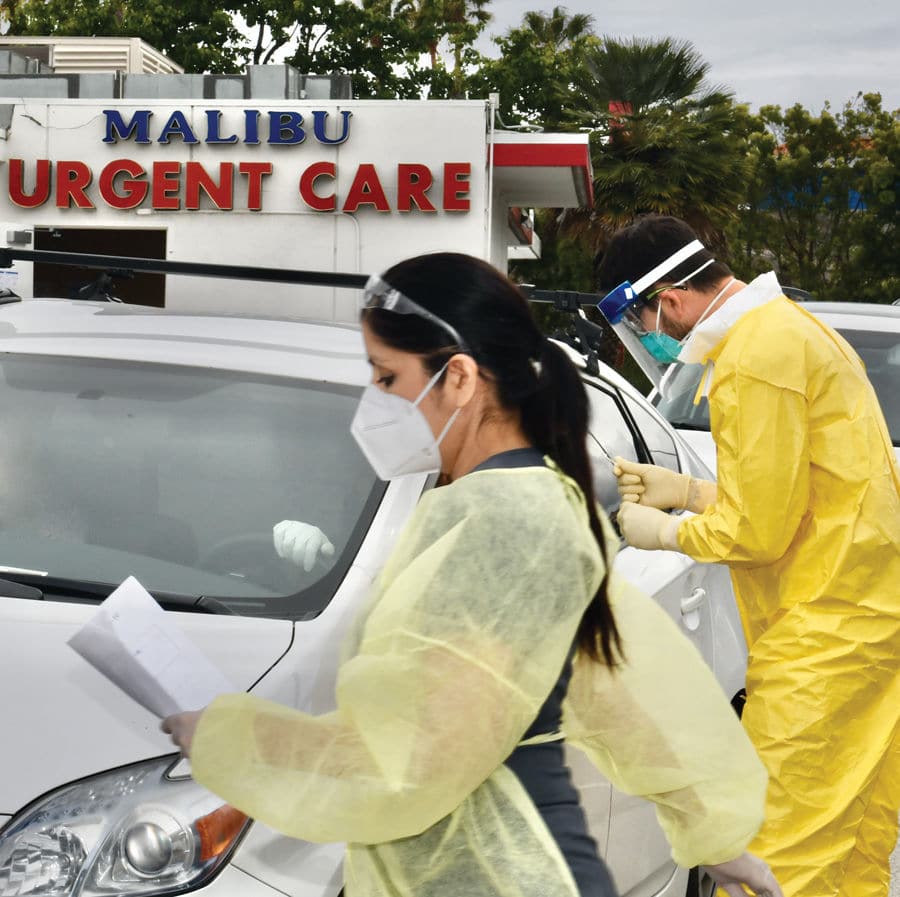
For years, Malibu was an urgent care desert. If you had a health emergency, it was a long drive to the closest emergency room in Santa Monica where minutes spent on Pacific Coast Highway could mean the difference between life or death. Then, in 1982, Malibu Urgent Care (MUC) opened to serve Malibu residents and visitors alike who needed emergency medical treatment without the long drive to the closest big city ER.
For a few years, from 1997 to 2001, MUC partnered with Saint John’s Hospital, which helped fund the operation. But for years now it’s been a nonprofit.
Now, its doctors are noticing a downturn in visits to the center, located near the intersection of Pacific Coast Highway and Webb Way, and are reminding Malibu not to let fears of contracting the novel coronavirus lead to neglecting your health—especially ignoring serious signs of trouble.
Doctors at the renowned Johns Hopkins Medical School have noted at least a 30 percent decline countrywide in patients seeking treatment. Fewer ER visits for serious problems such as heart attack, stroke and acute appendicitis could be riskier for patients than concern about contracting COVID-19.
The decline in urgent care visits appears steeper for MUC. While the clinic has been affected alongside many businesses since the pandemic began, it also faced losses after the Woolsey Fire and the opening of another urgent care clinic through UCLA Malibu. Not too long ago MUC might have seen 50 cases a day. Now, numbers are way down.
MUC started accepting a broader range of insurance so more people could have access to care. It will soon offer a rapid, 15-minute coronavirus test. Telemedicine is available, too. But Dan Katz, MD, a co-owner, advises “to not equate physical isolation with medical isolation.
“People have been experiencing symptoms,” the doctor said. “They are hesitant to come into the facility for fears of catching the virus when, in fact, they may have a severe condition. A professional can better help them decide what kind of care they need, whether that’s urgent care or a referral to a hospital.”
Katz stressed not to jeopardize your health. Even with COVID-19, he stated, “People don’t necessarily experience the classic fever, cough and shortness of breath.
“Some are quite sick and may require referral to a larger medical center,” Katz continued. “Our clinical acumen will allow us to make sure these patients are making the right decisions for themselves.” An example he cited: “I had a woman come in with nausea. She thought she was dehydrated. She ended up positive for COVID-19.”
Katz has been working to fight the disease at drive-up testing sites in March and April in Malibu and the Seminole Springs mobile home park, where residents were hit hard by the Woolsey Fire: “We did free testing for the underserved community.”
For those who need treatment for other ailments or broken bones, Katz assured, “We’ve taken precautionary measures and increased sanitation protocols.” Symptoms or not, every surface, from chairs to pens are wiped down rigorously “to keep patients safe.”
Patient numbers declining also spell trouble for MUC’s financial solvency.
Friends of Malibu Urgent Care (FoMUC)—a nonprofit—was organized years ago to help sustain MUC. Jack Evans, vice president of FoMUC, said part of what makes MUC such a valuable asset is also what makes it struggle financially.
“Medical practices are profitable when they’re 40 hours a week, but when they’re 80 hours a week they’re not,” Evans said. FoMUC pays for medical equpment and extra hours to keep the clinic open. Evans differentiated MUC from UCLA, saying, “MUC only has ER doctors. We provide an ER level of care.”
Evans said the virus has led to not only a drop in patients, but also a decline in donations.
“Donors are struggling financially as well,” he described. “Nonprofits are having a difficult time. We can’t have a physical fundraiser.”
Katz emphasized he wanted to thank the community for “their outpouring of support.” He described neighbors coming in with everything from cookies to meals from local restaurants, donated PPE and letters of support. “I feel fortunate to be working and part of this community,” he said.
